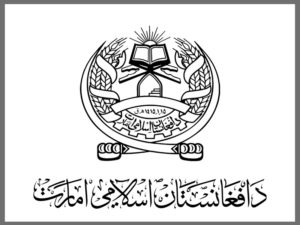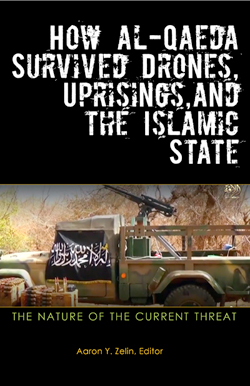
Click the following link for a safe PDF copy: The Islamic State’s Wilāyat Khurāsān — Ruling On Accepting the Citizenship of European and Western Infidel Countries!
_______________
Source: RocketChat

Click the following link for a safe PDF copy: The Islamic State’s Wilāyat Khurāsān — Ruling On Accepting the Citizenship of European and Western Infidel Countries!
_______________
Source: RocketChat

The Islamic State today looks different than it did five years ago and is far more integrated now as an organization amongst its global network than al-Qaeda ever was. It has been 10 years since the Islamic State announced itself as a caliphate and more than five years since it lost its last vestige of territory in Syria. However, with the Islamic State back in the news due to an increasing external operations capacity (with attacks in Iran, Turkey, and Russia this year as well as numerous broken up plots in Europe), there is a fundamental misunderstanding of how the group operates today. In many ways, it is either incorrectly viewed through the lens of how al-Qaeda operates (a decentralized branch network), since it had previously been a part of al-Qaeda’s global network, or based on how the Islamic State operated when it was at its prior zenith when it controlled territory in Iraq and Syria. It is also likely why some within the U.S. government may have misinterpreted signals intelligence by pushing the idea that the Islamic State leader targeted in Somalia at the end of May, Abd al Qadir Mumin, became the group’s caliph. These changes in the past five years are crucial for policymakers to understand because the way the threat presents itself today will look different from how policymakers dealt with the issue last decade when much of the focus was on the Islamic State’s territorial control in Iraq and Syria.
The most important body for understanding the Islamic State today is its General Directorate of Provinces, which has previously been based in Syria, but new information suggests that at least at the highest levels of it might now have centrality in Somalia. When one understands that structure, the Islamic State’s actions globally make more sense. It is also why we see far more interaction and connection between its various wilayat (provinces) today than in the past. In many ways, the key aspects that animate the Islamic State as an organization (governance, foreign fighter mobilization, and external operations) remain, they have just moved from primarily being based out of or controlled by its location of origin in Iraq and Syria to being spread across its global provincial network. Its aims remain the same, even if the organization has adapted to a changed environment. It is also why the challenge from the Islamic State today is different from the past and why it is in some ways also more resilient now to pressure than before.
This makes the challenge of the Islamic State more difficult from a security perspective than in the past when there was the ability to primarily zero-in on its efforts in Iraq and Syria. Today, only focusing on Iraq and Syria or any other province independent of understanding its connections to other parts of the group’s global network will lead to missing crucial details due to expediency. This is why, although it is understandable that the United States has shifted a lot of its manpower and budgeting to more existential and larger problem-sets such as China and Russia, it would be a mistake to neglect the Islamic State as a continuing, but evolving security challenge. Therefore, it is still useful to continue to have and add more funded government positions across different agencies and departments to focus on tracking this threat to better get ahead of the next surprise. Otherwise, mistakes of misinterpretation will be made as in the past.
Click here to read the rest.

Today in Doha, the Foreign Minister of the Islamic Emirate of Afghanistan Honorable Mawlawi Amir Khan Muttaqi and senior delegation held a joint meeting with ambassadors and representatives of US, EU and other western countries. H.E. Muttaqi talked in detail about the current Afghan situation, relations with other countries, prevailing economic difficulties, humanitarian assistance, resumption of incomplete development projects and existing sanctions, drawing the attention of all participants, adding that weakening the Afghan government is not in the interest of anyone because its negative effects will directly affect the world in security sector and economic migration from the country. Pressure tactics have not yielded results in Afghanistan, instead let us adopt constructive interaction and cooperation.
H.E. Muttaqi remarked our priority is paying salaries from previous months to half a million civil servants and resumption of new economic projects. In this regard we urge world countries to end existing sanctions and let banks operates normally so that charity groups, organizations and the government can pay salaries to their staff with their own reserves and international financial assistance.
Participants of the meeting agreed that an instable Afghanistan is not in the interest of anyone however they do have some concerns that must be addressed by you that will lead to positive effects on relations. Majority of participations asserted they have increased humanitarian assistance to Afghanistan and want to deliver it by the end of the year. Moreover, all were of the opinion to continue such meetings and interactions in the future.
Abdul Qahar Balkhi Spokesperson of Ministry of Foreign Affairs
6/03/1443 Hijri Lunar
20/07/1400 Hijri Solar
11/11/2021 Gregorian
______________

Over the past eight years, al-Qaeda’s fortunes have ebbed and flowed. Drones, uprisings, and a challenge from the Islamic State have forced the core al-Qaeda organization—historically based in the Afghanistan/Pakistan region—and its various branches to adapt and migrate outward.
In this new Policy Focus, Washington Institute fellow Aaron Y. Zelin compiles case studies demonstrating how each part of al-Qaeda’s network has evolved and survived the various challenges it has faced roughly since the Obama administration took office. Written by eminent scholars, practitioners, and government officials from the United States and abroad, the chapters are informed by a recent workshop in which the participants gave candid, off-the-record assessments of numerous key issues, including al-Qaeda’s current strategic outlook, a close examination of its branch in Syria, its branches outside of Syria (AQAP, AQIM, al-Shabab, and AQIS), and its current financial situation.
Contributors include: myself, Bruce Hoffman, Charles Lister, Daveed Gartenstein-Ross, Samuel Heller, Katherine Zimmerman, Andrew Lebovich, Christopher Anzalone, Don Rassler, Hans-Jakob Schindler, Katherine Bauer, and Matthew Levitt.
Click here to read the full publication (124 pages).

________________
To inquire about a translation for this video message for a fee email: [email protected]

_________________
To inquire about a translation for this video message for a fee email: [email protected]
The title of this release is in reference to Qur’anic verses 9:39 and 47:38.
—

___________________
To inquire about a translation for this video message for a fee email: [email protected]

________________________
To inquire about a translation for this video message for a fee email: [email protected]

____________________
To inquire about a translation for this video message for a fee email: [email protected]

___________________
To inquire about a translation for this video message for a fee email: [email protected]